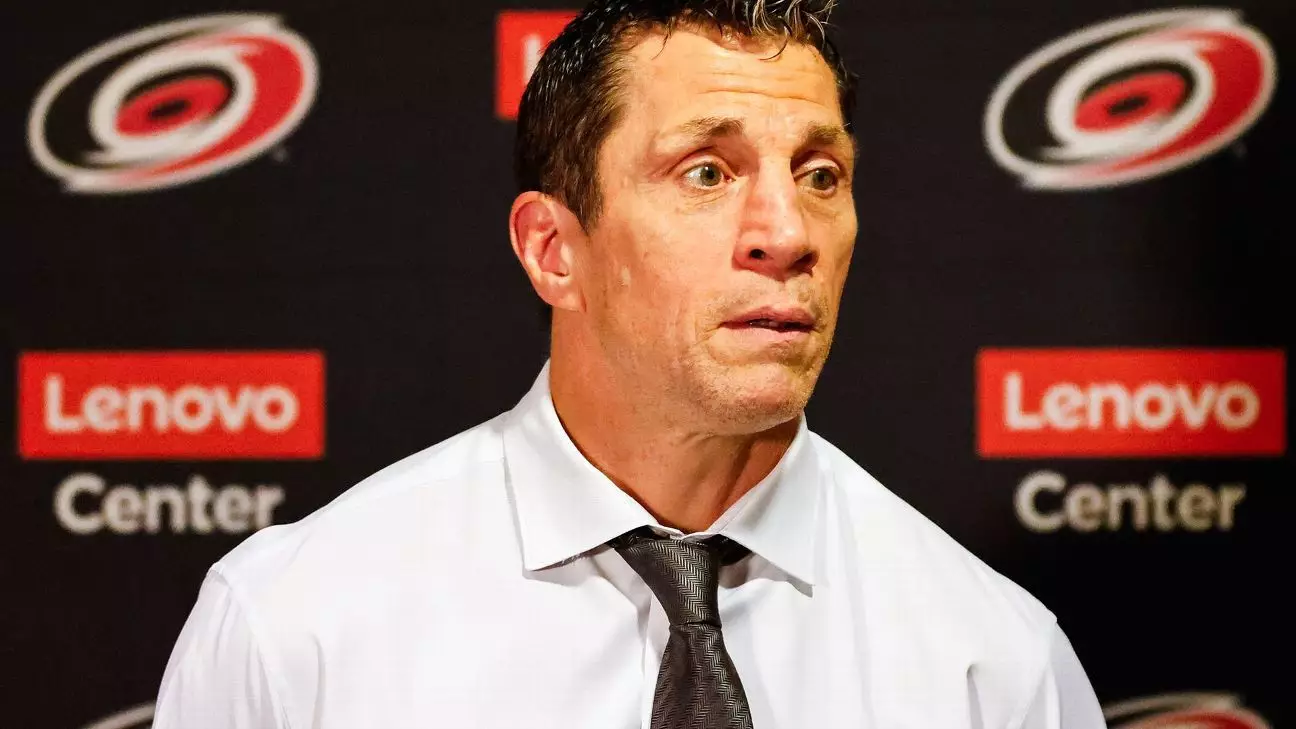In the high-octane world of the NHL, where physical prowess and mental resilience reign supreme, the handshake line at the end of a playoff series stands as a poignant reminder of sportsmanship. In recent discussions, Carolina Hurricanes coach Rod Brind’Amour articulated his strong belief that this time-honored ritual should not be sidelined, especially if we wish to keep the spirit of respect alive in sports. While Florida Panthers coach Paul Maurice has proposed a shift that excludes coaches and staff from this tradition, Brind’Amour’s resistant stance resonates with many who appreciate the deeper meaning behind this impactful act.
The handshake line is more than just a formality; it encapsulates years of dedication, rivalry, and sheer effort. Just as competing players endure grueling battles on the ice, their willingness to shake hands afterward symbolizes not only the end of a contest but also mutual respect forged through shared experience. Brind’Amour’s commitment to continue participating in the handshake line speaks volumes about his values as a coach and a leader. His insistence on honoring this tradition firmly roots itself in the belief that every member of the game—including coaches—deserves acknowledgment, even if their role wasn’t directly on the ice.
Coach versus Coach: A Clash of Philosophies
At the heart of this debate lies a fundamental philosophical divergence between the two coaches. For Maurice, the rationale is clear: he wishes to focus the limelight on the players rather than diluting it with a multitude of additional figures on the ice, including staff dressed in various styles—from suits to track suits. His perspective reflects a desire to honor the athletes who endure the bruises and sweat of each playoff game, advocating for a more streamlined experience which, in his view, emphasizes the players’ contributions alone.
Yet, this approach disregards a significant aspect of team dynamics. The contributions of coaches and staff members, who spend countless hours strategizing and motivating players, cannot be dismissed. Their absence in the handshake would inadvertently minimize their vital roles in preparing athletes for battle. By circumventing the handshake obligation, Maurice’s approach risks stripping the moment of its communal essence. Brind’Amour, with his eloquent reflections on the value of this encounter, reaffirms the complete tapestry of team dynamics where every thread matters, including that of coaching staff.
The Emotional Weight of the Handshake
Brind’Amour’s perspectives provide a refreshing reminder of the emotional weight carried in simple gestures. The handshake line is often where personal stories unfold—a chance for a former player to connect with veterans, or a mentor to recognize the growth of his protégé. As Brind’Amour shared, these moments are impactful, filled with nostalgia and respect. In a sport famously celebrated for its physical brutality, witnessing players embrace and acknowledge one another helps humanize the intense rivalries that characterize the NHL.
One might argue that by embracing such traditions, coaches like Brind’Amour reinforce the very foundations of sportsmanship and camaraderie. They can foster connections that extend well beyond the ice, cultivating relationships that promote unity across teams. This higher notion of respect encapsulates the spirit of hockey, where collective memory glows brilliantly even after the final whistle.
The Cost of Change
As we reflect on the traditions that shape sports culture, one must ask: what is the true cost of change? While Maurice’s intention to shift the narrative towards the players is understandable, is it worth risking the respect that underpins the entire framework of the sport? When one opts out of participation in meaningful gestures, the implications reach further than the ice—altering how future generations view sportsmanship.
Brind’Amour’s reaffirmation of the handshake line serves as a lesson for all. It provides a perspective that, while the game may be rooted in competition, it is also deeply entwined with respect, humility, and acknowledgment of shared hardships among players and coaches alike. In an age where the digital age often overshadows personal interactions, retaining such rituals is paramount. Thus, as the NHL evolves, it remains crucial to clarify the lines of respect that bind us, especially in the face of defeat.


Leave a Reply